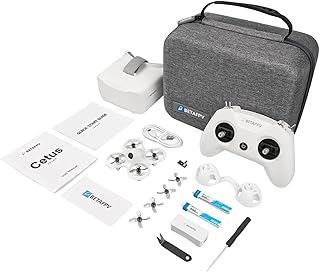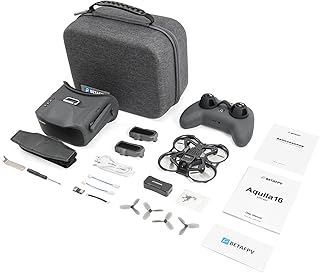Safety Tips for Flying a BETAFPV Drone
Flying a BETAFPV drone, or any drone for that matter, requires a strong emphasis on safety. Here are some essential tips to keep in mind:
Before You Fly:
* Know the Laws: Understand and comply with local, state, and federal drone regulations. This includes airspace restrictions, registration requirements, and limitations on where you can fly.
* Check Your Drone: Ensure your drone is in good working order, including battery charge, propellers, and flight control system.
* Inspect the Flight Area: Choose a safe and clear flying area. Avoid areas with obstacles, power lines, water bodies, or crowded spaces.
* Inform Others: Let people nearby know you'll be flying a drone. Be respectful and avoid disturbing anyone.
* Set Flight Limits: Pre-program your drone with altitude and distance limits to prevent accidents.
* Practice in a Safe Environment: Start with practice flights in an open field or park to get comfortable with the drone's controls.
During Flight:
* Stay Focused: Maintain constant visual line of sight with your drone. Avoid distractions and keep your focus on flying safely.
* Control Your Speed: Fly at a safe speed, especially when navigating near obstacles or people.
* Respect Privacy: Don't fly your drone over private property or in areas where people might feel uncomfortable.
* Be Aware of Your Surroundings: Observe weather conditions, air traffic, and other potential hazards.
* Don't Fly in Bad Weather: Avoid flying during rain, fog, or strong winds.
* Never Fly Near Airports: Respect airspace regulations and avoid flying near airports or other restricted areas.
* Never Fly Over People: Always maintain a safe distance from people and animals.
Additional Tips:
* Use a Safety Harness: Consider using a safety harness for your drone, especially during windy conditions.
* Install Propeller Guards: Propeller guards can help protect your drone and others from injury.
* Use a Battery Monitor: Monitor your drone's battery levels and land it before the battery becomes critically low.
* Fly with a Friend: Having a spotter can help increase safety and provide assistance in case of emergencies.
* Learn First Aid: Be prepared to handle minor injuries or emergencies.
Remember: Flying a drone is a privilege, not a right. Always fly responsibly and with safety in mind.
Note: This information is for general guidance and may not be exhaustive. Always consult with local regulations and resources for specific details.


